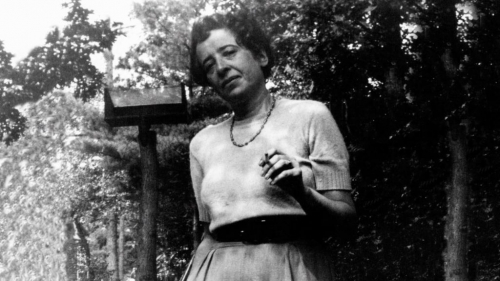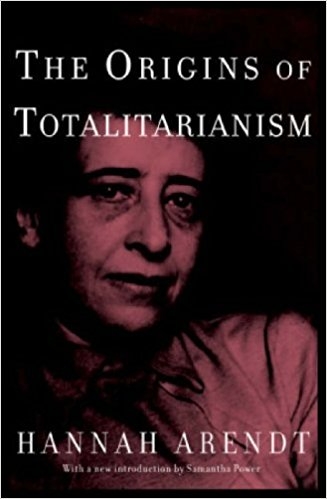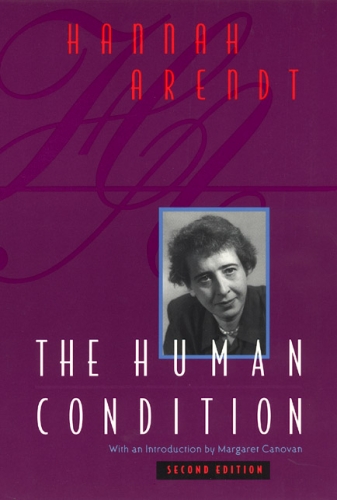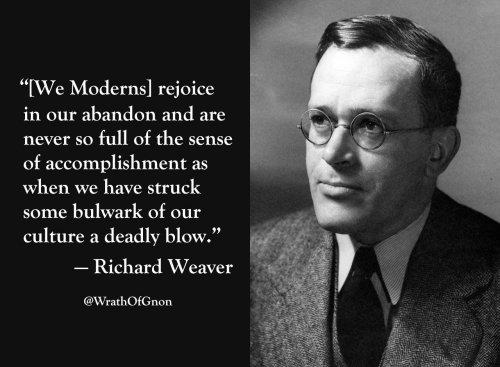mercredi, 21 mars 2018
Hannah Arendt and Richard Weaver on the Crisis of Western Education

Hannah Arendt and Richard Weaver on the Crisis of Western Education
Ex: https://www.brusselsjournal.com
In writing not so long ago about my appropriation of the “smart classroom” (that obtrusion of entertainment-technology into the solemnity of the academic space) so as to introduce students in a “Modern Drama” course to the mid-Nineteenth Century operatic theater of Richard Wagner, I concluded with the following thought concerning today’s collegians: “Their education, even in college, once they get there, leaves them bereft of high-cultural experience. That is a pity because taste tends to become fixed in late adolescence.” I remarked that contemporary freshmen, coming from a culturally jejune public-school curriculum, hover as though on a verge, intellectually speaking. “They will never respond to esthetic greatness unless they have an opportunity to experience it”; and yet, “those opportunities shrink away to fewer and fewer every year.”
In writing about the struggles that students experienced, first in understanding and then in articulating their responses, to two challenging novels by H. G. Wells, I ended with this meditation: “Like any healthy person, the specimen college student welcomes the chance to see things from a higher perspective, but the system as it stands is designed precisely to deprive students of any higher perspective. What passes for education is a mental diet of infant pabulum and an entrenched infantilism is one of its noticeable results.”
 Wagner was born in 1813, two centuries ago last year; he died in 1883, more than one hundred and thirty years ago. Wells was born in 1866; he died in 1946, nearly seventy years ago. To most college students, dates such as 1813, 1883, 1866, and 1946 are so many meaningless references, number-conglomerations about as significant from their perspective as the number-designations before the course-descriptions in the college catalogue. I was born in 1954. I can report accurately that I first read Wells, his War of the Worlds, in 1965, when I was a fourth-grader at Toland Way Elementary in Highland Park, California. I believe it was my brother, sixteen years my elder from my father’s first marriage, who recommended it. My father needed to check out the Wells omnibus from the Colorado Street branch of the Los Angeles Public Library because the institution shelved it in the adult section and I held borrowing privileges only in the children’s section. I first heard music by Wagner in 1970 or 71, when a quirky, German-born English teacher at Santa Monica High School, who went by the name of Gary Johnston, decided to enliven his summer “Myth and Folklore” course, or lighten the burden of his instruction, by providing us with mimeographed sheets of the libretto and playing for us on a portable stereo in the classroom excerpts from The Ring of the Nibelung.
Wagner was born in 1813, two centuries ago last year; he died in 1883, more than one hundred and thirty years ago. Wells was born in 1866; he died in 1946, nearly seventy years ago. To most college students, dates such as 1813, 1883, 1866, and 1946 are so many meaningless references, number-conglomerations about as significant from their perspective as the number-designations before the course-descriptions in the college catalogue. I was born in 1954. I can report accurately that I first read Wells, his War of the Worlds, in 1965, when I was a fourth-grader at Toland Way Elementary in Highland Park, California. I believe it was my brother, sixteen years my elder from my father’s first marriage, who recommended it. My father needed to check out the Wells omnibus from the Colorado Street branch of the Los Angeles Public Library because the institution shelved it in the adult section and I held borrowing privileges only in the children’s section. I first heard music by Wagner in 1970 or 71, when a quirky, German-born English teacher at Santa Monica High School, who went by the name of Gary Johnston, decided to enliven his summer “Myth and Folklore” course, or lighten the burden of his instruction, by providing us with mimeographed sheets of the libretto and playing for us on a portable stereo in the classroom excerpts from The Ring of the Nibelung.
The encounter with The War of the Worlds made a reader. A doctoral degree in Comparative Literature from UCLA (1990) and teaching career, such as it is, are late effects of the cause. The encounter with The Ring awakened a passionate interest in the Edda and the sagas, a curiosity for serious music, and an inclination to investigate into my mother’s Swedish ancestry, which (the last) eventuated in my first degree, a baccalaureate in Germanic and Scandinavian Languages, also from UCLA.
Other keynote events give articulation to my intellectual journey to adulthood. I omit to mention them, wishing not to bore my readers, except to say that they all have something in common with the two that I have just mentioned: Breaking into the immature consciousness, they put the child, or the adolescent, suddenly in touch with the past, with a tradition – and that bridging of temporal loci entailed the complementary experience that it lifted the initiate out of the present and thus also out of himself. The War of the Worlds is noticeably Edwardian; people take the train, ride in horse-carts, or walk; they read newspapers. Wagner’s Ring takes place in the time-before-time of myth, but its story has connections to events in the Fifth Century AD. Either way, the experience is foreign to someone whose milieu was the mid-Twentieth Century or is, as today, the incipient Twenty-First Century.
In both cases also, an older agent of transmission recommended to the younger person something that he regarded as meaningful and valuable – that the recommender implicitly (in the case of my brother) or explicitly (in the case of the eccentric English teacher) wished to preserve or conserve or pass along by making the representative of a new cohort amenably aware of it. Wells and Wagner made good gifts, intellectually; they proved themselves investments whose value has steadily increased over the years. Without such charitable gestures, every generation would begin again at the degree-zero of culture and history. Viewed in that light, contemporary education is not merely uncharitable; it is stingy and mean – its gift to the present is invariably the present, and when it mentions the past, it does so in language haughty and derisive.
I recently ran across a previous formulation of the same insight, to whose precedence and superior clarity I humbly defer. “It seems to me,” wrote philosopher Hannah Arendt (1906 - 1975) in her chapter on “The Crisis in Education” (included in her book Between Past and Present, 1961), “that conservatism, in the sense of conservation, is of the essence of the educational activity, whose task is always to cherish and protect something – the child against the world, the world against the child, the new against the old, the old against the new.” Arendt argues in a corollary to her “conservation” thesis that education functions “to preserve the world against the mortality of its creators and inhabitants,” an idea with a good Platonic pedigree. Arendt defines the teacher’s mission as the responsibility “to mediate between the old and the new, so that his very profession requires of him an extraordinary respect for the past.” At the same time, education must constitute itself as something more than “simple, unreflective perseverance.” Otherwise education becomes indoctrination, the production-line of Mandarins for the staffing of the managerial class, or mere rote learning.
 A good deal of contemporary education at all levels resembles just what Arendt describes, as indoctrinators prod students to internalize the correct opinions concerning the limited range of topics while guarding them against contamination by actual knowledge and rendering them incapable of independent judgment. The mandarins receive their training in the Ivy League while the rest receive instruction in the state colleges in how to defer to the righteous decrees of the mandarinate. Ideally, as Arendt urges, education should stand aloof from politics and social pressure rather than serving them. Politics and social pressure are corrupting forces, always totalitarian in their direction, always trying to crowd out everything else that constitutes the human world, so that nothing else constitutive of that world might compete with them. Politics and social pressure, belonging as they do to the isolated present, must stand in a hostile relation to history and tradition; respecting only themselves, they invariably revolt against “respect for the past.”
A good deal of contemporary education at all levels resembles just what Arendt describes, as indoctrinators prod students to internalize the correct opinions concerning the limited range of topics while guarding them against contamination by actual knowledge and rendering them incapable of independent judgment. The mandarins receive their training in the Ivy League while the rest receive instruction in the state colleges in how to defer to the righteous decrees of the mandarinate. Ideally, as Arendt urges, education should stand aloof from politics and social pressure rather than serving them. Politics and social pressure are corrupting forces, always totalitarian in their direction, always trying to crowd out everything else that constitutes the human world, so that nothing else constitutive of that world might compete with them. Politics and social pressure, belonging as they do to the isolated present, must stand in a hostile relation to history and tradition; respecting only themselves, they invariably revolt against “respect for the past.”
When Arendt writes of “the world” she means the continuum of tradition, that lore of human trial-and-error from which wisdom derives, that forms the object of the conscious curatorship that goes by the name of high culture. It is in this sense of “the world,” as the high-cultural image-of-existence, that the most oft-quoted passage from Arendt’s essay should be understood: “Education is the point at which we decide whether we love the world enough to assume responsibility for it, and by the same token save it from that ruin which except for renewal, except for the coming of the new and the young, would be inevitable. And education, too, is where we decide whether we love our children enough not to expel them from our world and leave them to their own devices, nor to strike from their hands their chance of undertaking something new, something unforeseen by us, but to prepare them in advance for the task of renewing a common world.”
One phrase in particular, the one concerning the question whether the current adult cohort will leave the members of current child-cohort “to their own devices,” has only increased in poignancy in the decades since “The Crisis of Education” first appeared. Politics and social pressure are now fully digitized and they make themselves universal through the ubiquitous “devices.” The necessary first reflection of the philosopher might well be the Cartesian formula, “I think therefore I am,” which indicates his reflective character. What then is the character of the person whose defining mental activity is not thinking, but tweeting? His character is assimilated to what I have elsewhere named post-literacy. He has become detached from the high-cultural continuum, detached also from history, whose medium is literature, and detached therefore from the possibilities of meaningful growth beyond the paltriness of youth-oriented popular entertainment. He might acquire vocational knowledge and skills, which he can apply to a job, but he will remain in his state of limitation and deprivation through the phase his merely chronological adulthood. He will suffer from a low level of verbal competency, from a restricted ability to reason, and from a concomitant vulnerability of manipulation through political propaganda and advertising.
Arendt writes of assuming responsibility for the inherited world, as the conservative or curatorial heart of education. A strikingly complementary notion occurs in the work of one of Arendt’s contemporaries who also wrote about the perils threatening education in the period of the Cold War. This writer saw in the self-styled progressive pedagogy of his day, which in his view had already begun to subvert traditional education, an essential “irresponsibility to the past and to the structure of reality in the present.” Indeed, he saw that the assumptions of this revolutionary coup-d’état in the classroom could never “serve as the foundations of culture because [they] are out of line with what is.” It was the case that “where [these assumptions] are allowed to provide foundations,” or to allege to provide foundations, “they imperil the whole structure.”
The other writer is Richard Weaver (1910 - 1963) and the lines quoted above come from the chapter on “The Gnostics of Education” in his book Visions of Order: The Cultural Crisis of Our Time (published posthumously, 1964). Arendt was a woman of the Left; Weaver was a man of the Right. That their separate and independent commentaries on the same topic, appearing in book form within three years of one another, should be so convergent and complementary is striking. What explains it? A commitment to civilization, shared across the political frontier, might be the best answer to the question. Both Arendt and Weaver, in contrast to the advocates of avant-garde pedagogy whom they criticize, see education in its conservative or curatorial role as a civilizational, rather than as a social, institution. When the high-school English teacher in Santa Monica brought his portable stereo to the classroom and invited his students to listen to Wagner, he appealed to them in the name of civilization, not in the name of society. At the time, society’s idea of music was The Beach Boys and The Rolling Stones. When I challenge students to read and appreciate Tono-Bungay by Wells, I do so in the name of civilization, not of society, whose notion of literary challenge is non-existent.
 Whereas Arendt expresses concern for the direction that education takes in a world, that of the late 1950s, dominated by technocratic convictions, Weaver frankly condemns “the progressive movement in education” for being a type of “apostasy,” and its advocates and practitioners for being “attackers and saboteurs” of actual education. Beginning with the same conception of education, Weaver departs from Arendt in his diagnosis of existing educational arrangements. Among their important traits, these progressives are epistemological nihilists who “do not have faith in the existence of knowledge” and whose real aim is “the educationally illicit one of conditioning the young for political purposes.” The revolutionary educational regime is also, in Weaver’s scrutiny of it, utopian and therefore totalitarian. It proposes “to substitute a subjective wishfulness for an historical reality.” Weaver omits to quote directly from the prescriptions of the radical educators, preferring to distill them in the form of his own summary. It is easy, however, to find textual support for that summary. In John Dewey’s seminal “Pedagogic Creed” (1909), with its bizarre imitation of the Nicene Creed (Dewey [1859 - 1952] was self-declaredly atheist), the anti-intellectualism of the School of the Radiant Future becomes immediately evident.
Whereas Arendt expresses concern for the direction that education takes in a world, that of the late 1950s, dominated by technocratic convictions, Weaver frankly condemns “the progressive movement in education” for being a type of “apostasy,” and its advocates and practitioners for being “attackers and saboteurs” of actual education. Beginning with the same conception of education, Weaver departs from Arendt in his diagnosis of existing educational arrangements. Among their important traits, these progressives are epistemological nihilists who “do not have faith in the existence of knowledge” and whose real aim is “the educationally illicit one of conditioning the young for political purposes.” The revolutionary educational regime is also, in Weaver’s scrutiny of it, utopian and therefore totalitarian. It proposes “to substitute a subjective wishfulness for an historical reality.” Weaver omits to quote directly from the prescriptions of the radical educators, preferring to distill them in the form of his own summary. It is easy, however, to find textual support for that summary. In John Dewey’s seminal “Pedagogic Creed” (1909), with its bizarre imitation of the Nicene Creed (Dewey [1859 - 1952] was self-declaredly atheist), the anti-intellectualism of the School of the Radiant Future becomes immediately evident.
According to Weaver, the object of progressive education “is not to teach knowledge”; it is rather, as the slogan says, to “teach students.” Dewey’s “Creed” fully supports Weaver’s characterization of progressive education just as it inaugurates the American chapter of Twentieth-Century pseudo-pedagogy. “I believe,” Dewey writes, “that we violate the child’s nature and render difficult the best ethical results, by introducing the child too abruptly to a number of special studies, of reading, writing, geography, etc., out of relation to this social life.” Never mind that “reading, writing, geography” and all that the etcetera also covers constitute Arendt’s “world,” that arduously accumulated representation of reality to which civilized people constantly refer in their negotiations in the market and in private. The world in its pre-existence must stand out of the way. Elsewhere, writes Dewey: “I believe, therefore, that the true center of correlation on the school subjects is not science, nor literature, nor history, nor geography, but the child’s own social activities.” The anti-literacy implicit in these formulas is quite astonishing; it is also at the root of the post-literate condition prevailing a century later.
In another formula, Dewey anticipates and justifies Twentieth-Century political indoctrination: “I believe that the image is the great instrument of instruction. What a child gets out of any subject presented to him is simply the images which he himself forms with regard to it.” Like good Chinese-Communist re-education leader, Dewey sees consciousness as “essentially motor or impulsive” and as “passive,” waiting to be remolded or, in Dewey’s unkillable phrase, “socialized.” Notice how the two formulas contradict one another. On the one hand, the child is supposed, creatively and originally, to produce the “images” through which he will learn. On the other hand, the child must submit willy-nilly to a regime of “socialization,” which implies external agency acting on a pliable object. One last quotation from the “Creed” will aid in understanding why Weaver refers to modern educators as “Gnostics,” which at first blanch is a rather odd attribution. While recalling his atheism, we let Dewey speak: “I believe that in this way the teacher always is the prophet of the true God and the usherer in of the true kingdom of God.”
Yes, Dewey invoked “the prophet of the true God” and “the true kingdom of God.” How to explain such hyperboles and grotesqueries? When Weaver sought the origins of the counter-intuitive propositions that education-reformers propound, the result of his search startled him. The rhetorical temerity with which he introduces his discovery attests his surprise. Weaver’s sense that “progressive education is a wholesale apostasy, involving the abandonment of fundamental and long-held beliefs about man and the world” directed him to the examination of historical apostasies. Among these he found only one that seemed to him “of a nature and magnitude to warrant comparison” modern pedagogic Messianism: “The Gnosticism of the first and second centuries A.D.”
Weaver gleaned the basic facts about Gnosticism from various Patristic texts and from the relevant chapters of Eric Voegelin’s New Science of Politics (1952), which he footnotes. Pedagogic Messianism, like ancient Gnosis, regards Creation as botched and imperfect, with the duty falling to man, who is more Godlike than the Creator, to fulfill it. The world, as either Pedagogic Messianism or ancient Gnosis sees it, including the entire human or cultural achievement, is an affront to man from which, bearing the spark of true divinity within him, man must escape; either that or destroy it so as to create again, this time perfectly. The Gnostics’ view of “the natural blessedness of man” and their rejection of any requirement for man to be redeemed by external agency made them, as Weaver writes, “antiauthoritarian.” Weaver remarks that such a notion “has a parallel in the attempts of our ‘progressive’ educationists to base everything on psychology,” quite as Dewey did. Weaver concludes that “the progressive educationists of our time, while not Gnostics in the sense of historical descent, are Gnostics in their thinking.” Furthermore, “their gnosticism exhibits the same kind of delusion, fantasy, unreality, and unacceptable metaphysics which the Church Fathers… challenged and put an end to.”

It is possible to add to Weaver’s description of the Gnostic attitude. Gnosticism, wherever it manifests itself, is only antiauthoritarian as a starting gesture; it invariably presents itself, once it has gained lodgment in an institution, as absolutely and incontrovertibly authoritative in status. It knows what it knows (the Greek gnosis means access to knowledge not vouchsafed to others) and it tolerates as a claim to knowledge only its own claim; it regards all other claims with implacable hostility. The original Gnosticism founded itself parasitically in received tradition, which it declared false while nominating itself as true; that resentment is the substructure of all Gnosis, whether of the ancient or modern varieties, is abundantly evident. A totally antithetic resentment is moreover totally dependent on what it anathematizes or resents; it produces nothing original. By way of compensation, as St. Augustine already observed of the Manichaeans, Gnosticism orders itself in a mockery of the hierarchy that it rejects, endows itself with ranks and distinctions, and congratulates itself on its dazzling achievements. It invents a special language, impermeable to outsiders, which it marks its users as an elect – all of which describes the innumerable contemporary Schools of Education to the proverbial “T.”
The specific crisis of education that Arendt and Weaver saw in common from their noticeably different perspectives is merely an instance of a larger crisis, a crisis of civilization as a whole through which the West has been passing perhaps since the Reformation but at least since the Eighteenth Century. This crisis is a revolt of those for whom the pressure of civilization is too great to bear, for whom therefore civilization is an unbearable burden. For the ego-in-revolt even so benign a thing as literacy is unbearable so that to it (the ego) and for it, literacy (and along with it literature) must together be sacrificed. Pictures please these people so pictures they shall retain; they are pretty and the mental challenge in them disturbs no one. Only through such sacrifices, and through such recursions to culturally primitive forms, will what Dewey brazenly called “the kingdom of God” be realized. It is best to have a clear view of the phenomenon, as grim as the prospect is.
00:34 Publié dans Ecole/Education, Philosophie | Lien permanent | Commentaires (0) | Tags : hannah arendt, richard weaver, éducation, école, philosophie, pédagogie |  |
|  del.icio.us |
del.icio.us |  |
|  Digg |
Digg | ![]() Facebook
Facebook



Les commentaires sont fermés.